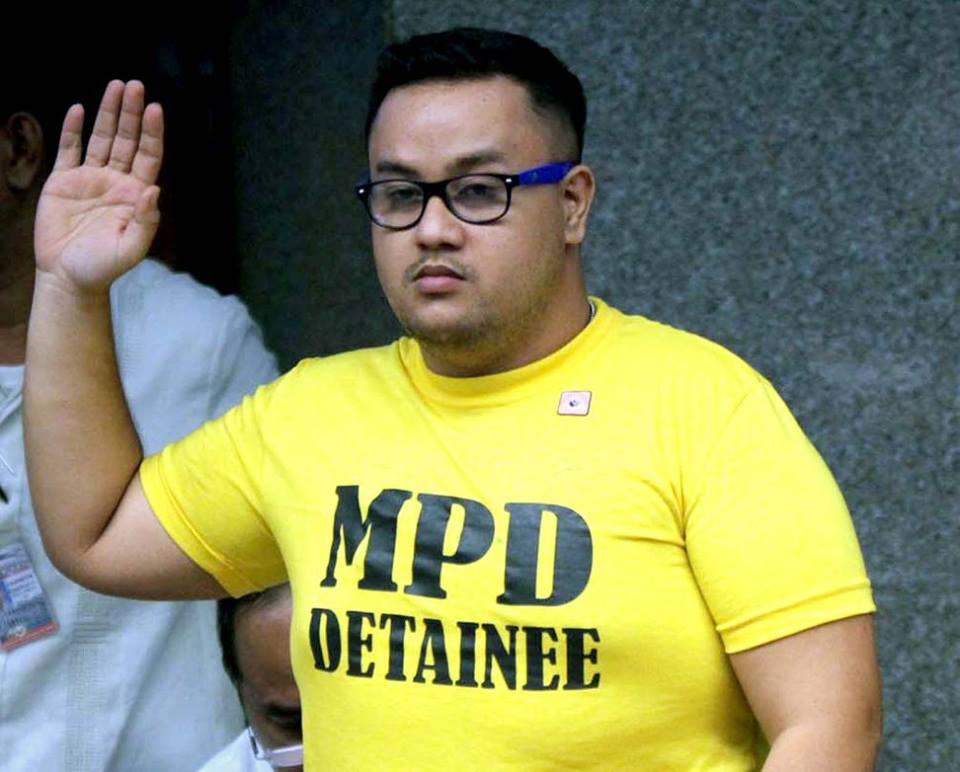Headline
DOJ junks Solano motion to exclude evidence in Atio hazing case

In the case of Solano’s judicial affidavit, Esmaquel said it was not subscribed to any person authorized to administer oath. (Photo: Senate of the Philippines/Facebook)
MANILA— The Department of Justice (DOJ) has dismissed the motion to strike out and exclude evidence filed by Aegis Juris fratman John Paul Solano in connection with the ongoing preliminary investigation over the hazing death of University of Santo Tomas (UST) law freshman Horacio “Atio” Castillo III.
“Wherefore, the foregoing Motion to Strike-out and Manifestation/Motion to Suspend/Exclude Evidence filed by respondent Solano is hereby denied for lack of merit,” read the five-page DOJ resolution dated Oct. 26, 2017 signed by the panel of prosecutors handling the hazing case, namely, Assistant State Prosecutor Susan Villanueva who sits as the chairwoman and Prosecution Attorneys Wendell Bendoval and Honey Rose Delgado.
Solano’s lawyer Paterno Esmaquel submitted a four-page motion to strike before the DOJ investigating panel led by Villanueva during the start of the preliminary investigation on the charges filed by the Manila Police District (MPD) in connection with Castillo’s death.
Esmaquel said that before the complainants could use Solano’s judicial affidavit dated Sept. 17, 2017, it must first subscribed and sworn to before any prosecutor or government official authorized to administer oath, or in their absence, before a notary public.
In the case of Solano’s judicial affidavit, Esmaquel said it was not subscribed to any person authorized to administer oath.
Esmaquel even accused MPD Homicide Division chief Senior Inspector Rommel Anicete of falsifying Solano’s judicial affidavit by signing the same and making it appear that it was subscribed before him.
The lawyer noted that his client never appeared before Anicete to subscribe under oath the said affidavit.
In fact, Esmaquel said at the time Solano executed the judicial affidavit, there was no police officer present that is authorized to administer oath, including Anicete.
“All told, it is a plain and simple falsification of public document and/or submission of false testimony and/or perjury for the complainants to submit and use as evidence in the instant complainants the said falsified judicial affidavit of the herein respondent,” Solano’s counsel said.
“Accordingly, the herein respondent respectfully submits that his alleged judicial affidavit is a fruit of a poisonous tree and thus, the same is inadmissible as evidence in any courts of law or proceedings not only for being a falsified document but also because it was executed in violation of his constitutional right,” he added.
Prosecutors explained it could not strike out Solano’s judicial affidavit because it is the reason why he has been accused of having committed perjury.
“Respondent Solano’s arguments in the first motion fail to persuade. Precisely, a complaint for perjury was filed against him because his narrations on the circumstances surrounding his alleged discovery of Atio’s body, which was found to be contrary to the evidence found by the police officers resulting from the follow-up investigations that they conducted,” prosecutors said.
“Moreover, respondent Solano categorically admitted authoring and signing the affidavit,” they added.
In the counter-affidavit he submitted before the DOJ last October 24, he admitted he was asked to go to the Aegis Juris library to help revive Atio on September 17 and was also the one who brought the neophyte to the Chinese General Hospital.
As to the items seized by police at the fraternity library, prosecutors said “it is not within the province of the Panel to determine whether the evidence gathered from the implementation of the search warrant have been obtained illegally, and should thus be excluded in the determination of probable cause for the crimes charged in the complaints.”
“Finally, it is significant to note that the occasion of a preliminary investigation is for the presentation of such evidence only as may engender a well-founded believe that an offense has been committed and that the accused is probable guilty thereof.
Solano, a medical technologist, had previously lied that he brought the badly beaten Castillo to the Chinese General Hospital after he found him slumped on a road pavement in Tondo, Manila on September 19.
He later admitted during the Senate inquiry that he was just following orders from elder Aegis Juris members who had sought his assistance in reviving Castillo.
Solano, a member of the fraternity who was tagged as the primary suspect in the case, has been charged with murder, obstruction of justice, perjury, robbery, and violation of Anti-Hazing Law charges.
Solano, Aegis Juris Fraternity president Arvin Balag and Axel Hipe claimed in their counter-affidavit that Castillo died from a pre-existing heart condition called hypertrophic cardiomyopathy and not from hazing injuries.
The other respondents led by UST law dean and fraternity member Nilo Divina have also submitted their respective answers to the DOJ panel and sought the dismissal of the charges.
Villanueva said she had given other respondents until November 2 and 3 to submit their respective counter-affidavits.
The panel of prosecutors set the submission of a reply on November 9 and November 16 for the filing of rejoinder.
Castillo died after attending the “welcoming rites” of the fraternity last September 16.





















